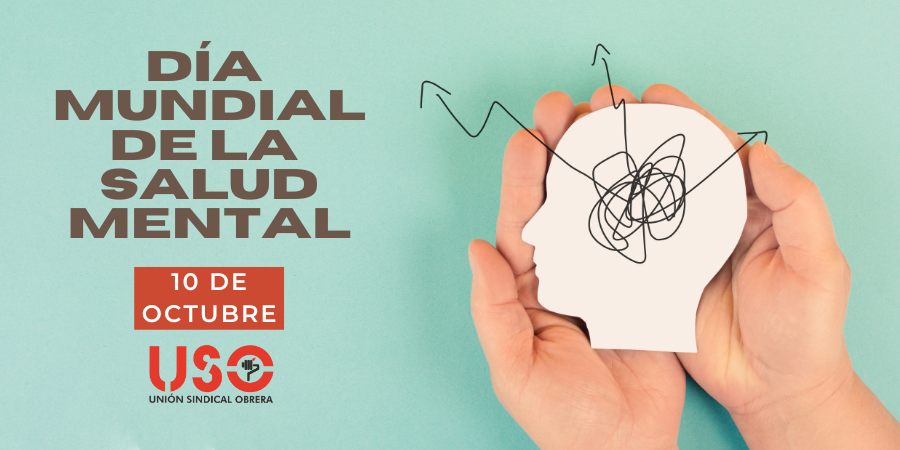On World Mental Health Day, at USO we review how work can be the origin or aggravation of these problems and we urge you to prevent them.
On World Mental Health Day, at USO we analyze how working conditions can influence and even trigger mental illnesses. Sometimes, aggravating previous conditions; but, others, provoking them, being the main origin of that alteration.
Having adequate, safe and stable working conditions contributes to maintaining the mental health of workers. There are various personal factors that have a negative impact on our mental health, but other work-related factors also have an influence on how we feel and can lead to serious problems.
Depression and anxiety can have their origin in extreme situations in the workplace, related to discrimination or inequality at work, excessive workloads or job insecurity. Working in a safe and healthy work environment is essential for maintaining proper mental health. In fact, 1% of workers have had mental health problems caused or aggravated by work.
According to the INSST report “Mental health and work: situation diagnosis”, with EPA data from 2020, 32% of workers suffer from time pressure or work overload. It is a factor that they identify as harmful to mental health. 16% consider that dealing with clients, patients or students is also a factor linked to mental health at work.
Another fact to take into account is that 1% of the working population has had, in the last year, a mental health problem (stress, anxiety or depression) caused or aggravated by work. This percentage is higher in the case of women (1.2%) and drops to 0.9% in the case of men.
Professions that harm mental health the most
The professions most exposed to factors that can affect mental health are transportation and storage; financial and insurance activities; Public administration and health and social services activities.
On the other hand, according to data from the Information System on Work Accidents due to Non-Traumatic Pathologies (PANOTRATSS), in the period 2017-2020, anxiety episodes represented 73% of the cases, followed by post-traumatic stress (25%).
3% of the sample of the 2020 European Health Survey-Spain has suffered from depression in the last year, although they do not attribute it directly to work. This percentage increases among employed women (4.4%), increasing with age and in people with part-time jobs.
However, in the case of anxiety – which affects 4.6% – causes that have to do with work are mentioned. In addition to the partiality of employment, other characteristics of work that are associated with the deterioration of mental health also appear: temporary employment, absence of a contract and work in certain activities, such as domestic employment, artistic, recreational and entertainment activities, and health and social services.
Main origin of mental health disorders in the work environment
By analyzing the data, we extract information about the situation of occupational mental health in Spain in recent years. Thus, it is inferred that the main origins of mental health alteration in the work environment are:
- Discrimination or inequality at work.
- Excessive workload.
- Insecurity and job instability.
- Pressure to complete tasks under certain conditions (deadlines, scarce resources…).
- Interpersonal relationships at work (clients, colleagues, patients, students…).
And, on the other hand, the professions most exposed to these risk factors are:
- Logistics and transportation.
- Financial and insurance activities.
- Public administrations.
- Health activities and social services.
Mental health: factors at work
Jointly evaluating the information provided by the Active Population Survey, the Information System for Work Accidents due to Non-Traumatic Pathologies, the Information System for Work Accidents with sick leave and the European Health Survey with data referring to our country. , it is observed, in addition to the factors of origin of mental health alteration and sectors with greater exposure, that this type of alterations in work environments affects women in greater numbers than men. This is mainly motivated by the majority profile of employment occupied by women.
They frequently occupy part-time jobs with precarious conditions. And, often, they have to combine them with working at home caring for or taking care of children, the elderly or dependent people. As a whole, it causes access to jobs with better conditions to be limited, bringing with it consequences in terms of mental health alteration.
At USO, we want companies, just as they do with the risks that compromise the physical health of workers, to be able to identify those risks that can alter the mental health of workers and eliminate or control them so that everyone We can work in safe and healthy environments and do not encounter sources of risk at work that affect our health, both physical and mental.
